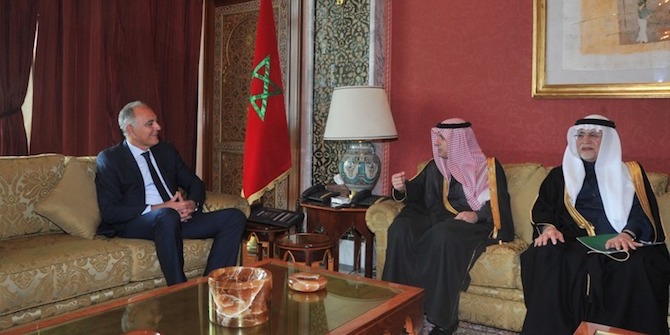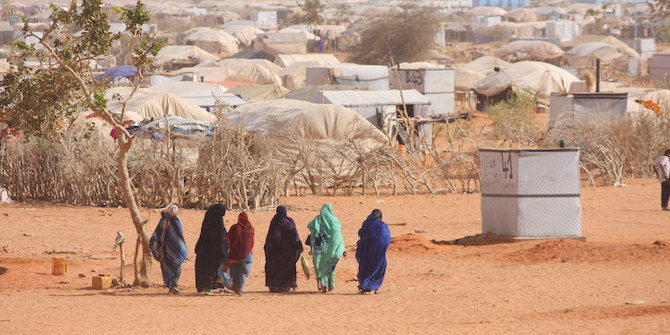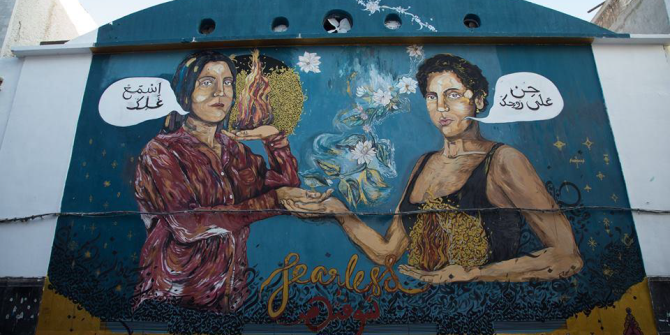by Bronwen Manby

A recent research project for the Middle East Centre of the London School of Economics explored the challenges of accessing documentation and recognition of nationality for migrants and refugees as they navigate the interactions between the identification systems of their host and home countries. The project was conceived against the background of two important global initiatives: the campaign and ten-point action plan to end statelessness within a decade, launched in 2014 by the Office of the UN High Commissioner for Refugees (UNHCR); and the target set by the Sustainable Development Goals (SDGs) to ‘provide legal identity for all, including birth registration’ by 2030. These commitments were then picked up in the two ‘Global Compacts’ adopted in 2018, on refugees and on migration, emphasising ‘access … to civil and birth registration and documentation’ for refugees and stateless persons and provision to all migrants of ‘proof of legal identity and adequate documentation’.
Action 7 of the UNHCR action plan was also to ensure birth registration for the prevention of statelessness: while birth registration in itself does not confer nationality, and in most countries is not legally proof of nationality, the official record of the place and date of birth and identity of the parents of the child provides critical evidence of the facts that enable the child to assert the right to nationality in one or more states. The SDG target, meanwhile, reflects a recently consolidated consensus among development professionals on the importance of robust identification systems for the strengthening of government capacity and as the basis for entrepreneurial activity.
Legal Identity and Birth Registration in International Law
Birth registration and the protection of identity are firmly established as rights in international law, including the 1989 Convention on the Rights of the Child (CRC), to which every country in the world is a party apart from the United States of America. Article 7 of the CRC, like Article 24 of the International Covenant on Civil and Political rights, provides for every child to have the right to a name, to be registered immediately after birth and to acquire a nationality. A number of other UN and regional treaties have similar commitments. Universal birth registration, ‘the continuous, permanent, compulsory and universal recording within the civil registry of the occurrence and characteristics of birth, in accordance with the national legal requirements’, is a long-standing objective of UNICEF and other agencies concerned with child welfare.
There is accordingly extensive international guidance on the implementation of birth registration, within a broader framework of civil registration. Nevertheless, national legal frameworks and institutions for civil registration vary widely: not just between the civil and common law traditions, but with distinctive characteristics in Islamic societies, (formerly) communist states, states that have sought to formalise recognition of customary law, or those where registration is rather at the family or household level. These differences create immense complexities in cross-border recognition of civil status documents. They also require access to consular assistance (or travel to a home country) to obtain the legalised copies of documents required, for example, for parents to register a birth in another country. Moreover, consular registration and/or transcription into the records of the state of origin is often necessary if the child’s right to the nationality of one or both parents is to be recognised. These questions of conflicts of law and access to consular assistance are critical for the UNHCR and SDG targets to be achieved, but barely studied in relation to those states where the risks that a person cannot prove legal identity are highest.
Access to Birth Registration and Risks of Stateless among Migrants and Refugees
North Africa, historically known for high rates of emigration, is increasingly learning to accommodate people whose origins lie in other regions of the world, many of them undocumented. There are extremely limited existing rights to acquire nationality based on birth in the territory of the North African states, requiring law reform to address these gaps, but also the preservation – through civil registration and identity documents – of legal connections to a country ‘of origin’.
The LSE Middle East Centre collaborated with partners in Egypt and Morocco – the Centre for Migration and Refugee Studies (CMRS) at the American University in Cairo, and the Association marocaine d’études et de recherches sur la migration (AMERM), based in Rabat – to research the particular challenges related to registration of births and identity documents faced by migrants and refugees.
Despite high reported rates of birth registration in both countries (99% in Egypt and 94% in Morocco), refugees and irregular migrants reported serious difficulties in securing birth registration for their children in the host country.
The most common difficulty obstructing foreign parents from registering the births of children is the requirement for a marriage certificate – for all parents in Egypt and for Muslim parents in Morocco. No consideration is given to the inability of a refugee to approach his or her embassy to obtain a copy of a certificate issued in a country of origin; nor to the fact that even parents who are married in the eyes of their own society may never have had such a document, if they were married under customary law or with only a religious ceremony, or came from countries where no civil marriage certificate exists (for example Sudan, South Sudan, and Syria).
The problem here in Morocco is that when you don’t have a marriage certificate and you are Muslim they register the births as father unknown. My husband is the father of four girls of which two are born in Morocco, and they are registered as children of unknown fathers. I’m against this solution. – Nigerian woman
Birth registration is legally not possible in Egypt if the parents lack currently valid identity documents, and practically difficult in Morocco. Yet it is very common for migrants to arrive, particularly from Sudan, South Sudan, Ethiopia, and Eritrea without identification documents of any kind for themselves or their children. If they have no asylum or refugee document, or if their claim has been rejected, or if they cannot approach their consular authorities – because they fear to do so (even if they have not claimed refugee status) or are rejected as non-nationals – then they cannot register the births of their children.
I’m in a serious situation. I can’t get an identity document that allows me to register my three children with the Moroccan authorities…. I don’t want to have anything to do with the embassy for many reasons you can understand. – Ivorian woman
Registration of a child’s birth in Egypt also requires a residence permit showing legal presence in Egypt. It is a constant challenge even for recognised asylum seekers and refugees, or ordinary migrants in regular status, to keep their permits valid, since in most cases they expire after six months and it takes around two months to receive a new one. In Morocco, the law does not require legal residence in the country to register a child, but a factual ‘residence certificate’ issued by a local government authority is often demanded; while the fear of being expelled by the Moroccan authorities as an irregular migrant held some back from trying to register a birth.
Adult migrants seeking to restore lost or stolen identity documents reported that high fees – usually several hundred dollars for issue or renewal of a passport – put them out of reach.
My son’s passport has expired. He wants to register his son who is now 10 months old but he cannot do so with an expired passport. He cannot afford the cost of renewing it. – Syrian man
If a child is born outside of a registered health facility, the lack of an official birth notification makes it much harder to prove to the satisfaction of the civil registration authorities that the child is connected to the parents. Moreover, even though birth registration is supposed to be free in both countries, invisible costs included transport and lost income from other activities, and above all the costs of obtaining the supporting documents required from the consulates. There were cases where clinics had refused to issue a birth notification because medical fees had not been paid. Given all these challenges, the period for timely registration of births – 30 days in Morocco, 15 days in Egypt – was unrealistic. While late registration is possible, it is more onerous, especially in Egypt, requiring official investigation and multiple copies of notarised documents translated into Arabic.
But what about my son? I asked the lawyer and he said registering him will be more difficult because he is already five years old. Even if we try to get a marriage certificate, we will not be able to use a new certificate to register a five-year-old child. We do not have a birth notification. Nothing to prove that he was born in Egypt. We were smuggled into Egypt through the border so there is no proof that we delivered him here. – Sudanese woman
The research in Egypt came across many cases of adults taking care of unrelated children from their community, whether the parents were unknown, or dead, or had abandoned the child. There is a procedure for registering foundlings, who should under the law be presumed nationals, but few knew about it and there were suggestions that this protection is not applied in case of children where there is the belief that the parents are originally from another country. Often, however, the parents are known, but no longer able or willing to look after the child. The adult caring for the child has no way of legalising this relationship.
Another category of children with no way to resolve a lack of documents were those who were not born in Egypt or Morocco, but rather in the country of origin or en route. There is no practical option for parents in this situation to obtain late registration of birth from the country of birth, and no procedure in either Egypt or Morocco, or among consular authorities, to recognise the child’s link to the parents and provide identity documents.
We cannot register children who were not born in Egypt. Some of us give birth on the way from Eritrea to Egypt. Some of us stayed for a long time in Sudan and gave birth there. We did not get birth certificates there. Here, we cannot provide the authorities with the documents to register the children. Someone told me we have to lie and say the child is born in Egypt to get the birth certificate. But they will know that the newcomers with older children could not have delivered here. What do we do now? – Eritrean woman
Many migrants and refugees interviewed had no idea that, in most legal systems, births must also be registered with their consular authorities for the legal connection between parents and child to be recognised in the home country; and consular authorities showed little concern to provide assistance to those who were not business people, students or others with regular migration status.
We’re scared of being arrested and sent back. The consulate doesn’t care about the irregular migrants, they won’t give us a consular card to protect us. The clandestins are not welcome. – Ivorian woman
Migrants and refugees from Syria reported that their embassies were effectively inaccessible to them. Migrants and refugees from Ethiopia, Eritrea, Sudan and South Sudan faced the same problem, exacerbated by the complexity of their status as regards identification, thanks to the separation of Eritrea from Ethiopia in 1992 and of South Sudan from Sudan in 2011. The secessions have left people believed to be of South Sudanese origin living in Sudan, or believed to be of Eritrean origin living in Ethiopia, with serious difficulties in obtaining recognition of Sudanese or Ethiopian nationality, even if they are entitled to it. For those who are migrants or refugees in other countries, these challenges are even more grave.
I know a girl from South Sudan; her father has a passport from the North and the South. When her parents went to the Sudanese embassy they told them to go to the South Sudanese. When they went to the South Sudanese they told them no you should go to the North. – Sudanese man
The obstacles to birth registration in both countries create the situation where those who cannot produce a marriage certificate or their own identity documents have to register their children under the names of other people. In Egypt, our research came across one family of four children, each of them registered to different fathers – although they were all born to the same father, who was not listed on any birth certificate. The lack of a demonstrated legal connection could mean, for example, that those who finally secured resettlement in a third country – or who were deported – could not take their children with them.
The immediate consequences of these difficulties included the inaccessibility of education, health and other services for the children concerned, and greater vulnerability to exploitation. In the longer term, the consequences include the high risk of statelessness.
Conclusion: Legal Identity, Birth Registration and Statelessness
Universal birth registration is unlikely to be achieved unless it is delinked not only from the parents’ legal status in the country – creating a wall between civil registration and immigration enforcement – but also from the common requirements to provide documents to prove the identity, nationality, marriage, and legal residence of the parents. International law provides no right to the consular assistance that is needed by a person navigating these cross-border registration labyrinths. It protects the right of a state to assist its nationals (should it so wish), and the rights of migrants to be informed of the availability of the assistance that does exist, but does not establish an obligation for states to provide assistance.
But if these barriers are removed, so that details noted in the birth registry entry could be based on simple declaration by the parents, the recognition of the child’s right to nationality may be even more at risk – unless the birth is in one of the minority of states (mostly in the Americas) that provide nationality on a jus soli basis without further conditions.
Thus, even with universal birth registration, many children could be left without a recognised nationality – and would remain unrecognised as adults. UNHCR’s global action plan to end statelessness therefore proposes minimum legal and procedural reforms to supplement the commitment to birth registration. In principle, SDG Target 16.9 should provide a significant boost to the success of UNHCR’s ten year campaign, mobilising funds to strengthen civil registration systems that would otherwise not be available. Nonetheless, it is significant that the states adopting the SDGs preferred to avoid the question of statelessness and the right to a nationality, and specify only the less controversial target of universal birth registration – with the indicator considering only children under five, rather than late registration of adults. The more general focus in the SDG target on ‘legal identity’ carries the risk that it will be mobilised rather for migration control and surveillance, than the protection of rights and provision of services. Indeed, the language in the Global Compact on Migration relating to provision of identity documents was watered down from the initial draft in order to reduce the focus on rights and increase the focus on control.
This article was first published in French in Plein droit, the journal of the French migrants’ rights organisation GISTI (Groupe d’information et de soutien des travailleurs immigrés), vol 128, March 2021. For more on Bronwen Manby’s Academic Collaboration research project, ‘Preventing Statelessness among Migrants and Refugees in North Africa’, see here.







Thank you for posting the informative article. This will help everyone to have more insights about birth certificates, knowing that they are the most important document we need. Excellent article! Keep on posting!